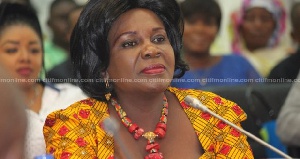Madam Cecilia Abena Dapaah, the Minister of Sanitation and Water Resources, has commissioned a water facility provided by Safe Water Network at New Adjena for nearly 5000 residents in the Asuogyaman District of the Eastern Region.
The water facility, also known as an H2OME Water Station, would also serve the residents of Pesse.
The project was completed with support from the Embassy of the Kingdom of the Netherlands through its Ghana Netherlands WASH Programme, the Conrad N. Hilton Foundation, the Stone Family Foundation and Newman’s Own Foundation and the Asuogyaman District Assembly.
So far, Safe Water Network has provided almost 380,000 people with potable water in about 140 communities.
Madam Dapaah, therefore, commended Safe Water Network’s efforts at providing deprived communities with safe, reliable and affordable water, saying that its effort was consistent with the Ministry’s mandate and the vision of the President to provide safe water for all in Ghana by 2025.
Madam Dapaah said the Government had received additional financing from the International Development Authority of the World Bank for about $45.7million under the Sustainable Rural Water Supply and Sanitation Project.
This funds, she said, was being used to provide water facilities for about 600,000 people in 90 districts and 11 regions.
“By the end of 2019, the Government would have sought for loans totalling about $1 billion that will be invested in providing improved access to safe water,” she added.
Mr Allen Merchill, Senior Vice President for Safe Water Network said: “Our objective is to demonstrate a sustainable model for broad-scale replication for delivering water services at credible scale.”
Safe Water Network would implement a robust post-launch sustainability monitoring system, including the deployment of resources from its Field Service Entity into the community and build a partnership with community-level leadership to ensure the successful management of the water station, he said.
“With the launch of this station, Safe Water Network has been able to reach nearly 400,000 people in over 130 communities with reliable and affordable safe water. Our goal is to reach 150 communities and 500,000 people; but we cannot do this alone”.
Mr Charles Nimako, Safe Water Network’s Director of Africa Initiatives, said partners such as the Government of Ghana, bilateral, multilateral and private foundations were critical to achieving this goal.
The H2OME Water station applies a Modular Slow Sand Filtration system (MSSF) technology with chlorine dosing equipment and will produce an average of 90,000 litres of water daily.
To minimise the station’s operating cost and ensure uninterrupted water supply, the H20me water station uses solar power as the primary energy source with the national electricity grid as a back-up.
A household connection programme with prepaid meters has also been rolled out to provide convenient water services to customers in their homes, which is consistent with the United Nations Sustainable Development Goals.
General News of Friday, 4 October 2019
Source: ghananewsagency.org













